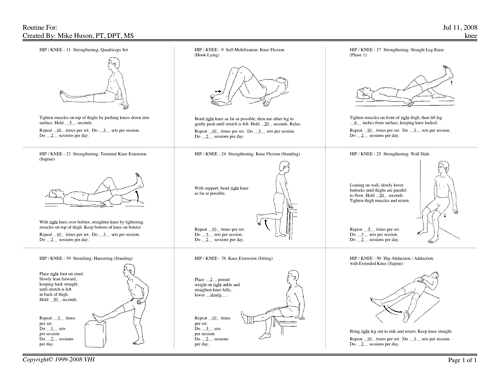The Set
up
|
When the
patient walk in the facility they will likely have to wait
a few minutes while the PT wraps up with the patient from
the prior hour. Some patients may begin with a moist hot
pack to loosen up muscle tightness.
|
Warm Ups
|
Once the PT brings
back the patient, they will walk them back to begin with
an exercise designed to prepare the patient for more
difficult exercises. Riding the bicycle for five minutes
is a common warm up for those with lower extremity
injuries or shoulder blade squeezed for those with
cervical/shoulder involvement. All warm ups can be
performed typically while the PT interacts with the
patient about their pain level after the prior session as
well as current symptoms or concerns.
|
Exercises
|
Exercises in Physical
Therapy vary greatly depending on the injury, but all are
typically performed every session a patient comes in. The
PT will always monitor and increase the weights used for
exercises to ensure that progression is evident. A common
stability exercise could be alternating bicep curls, and
the PT will first demonstrate proper form. After the form
is learned to PT will allow the patient to complete the
appropriate number of repetitions. It is important to have
the proceeding exercise ready for the patient because it
maximizes time as well as showing the patient they are
important and being taken care of.
|
Stretching/
Treatment
|
Stretching and working
hands on with a patient is a key component of physical
therapy. It gives the PT direct feedback on how the
patient is progressing as well as giving the patient the
feeling importance. Hands on work allows the PT to vary
the results of a activity depending on the specific
patient. Some patients benefit from different methods of
the same exercise, so the PT can make changes on the go
because they are directly involved and ready. Treatments
may also involve the use of ultrasound
and electrical
stimulation. These treatments directly affect the
involved area on the patient and typically give great
temporary relief of pain.
|
Traction or Cool
Down
|
Depending on the pain
level the patients always have the opportunity to ice down
with a cold ice pack at the end of their session, this
helps relieve some of the pain that had accumulated during
their session and gives them time to take a second to
relax after working hard. Some patients will also receive
mechanical
traction or manual traction as well. Gaping of the
spine is a common traction method and a table that pulls
with a designated force to gap the spine and give great
relief in pain. Patient can greatly benefit form traction
at the end of their session.
|
Home Exercise
Program
|
Important aspects of
Physical Therapy is the home exercise program. There are
twenty four hours in a day and only of those is spent with
the PT. The construction of a good HES is what is going to
assist the patent in making gains in their rehabilitation
process. Exercises performed at home are meant to continue
the progress, but exercises at home are also not as
intense as those performed in the facility, for safety
reasons. It is important the PT makes clear to the patient
what they should and should not be doing at home. Some HES
are available
online.
|

